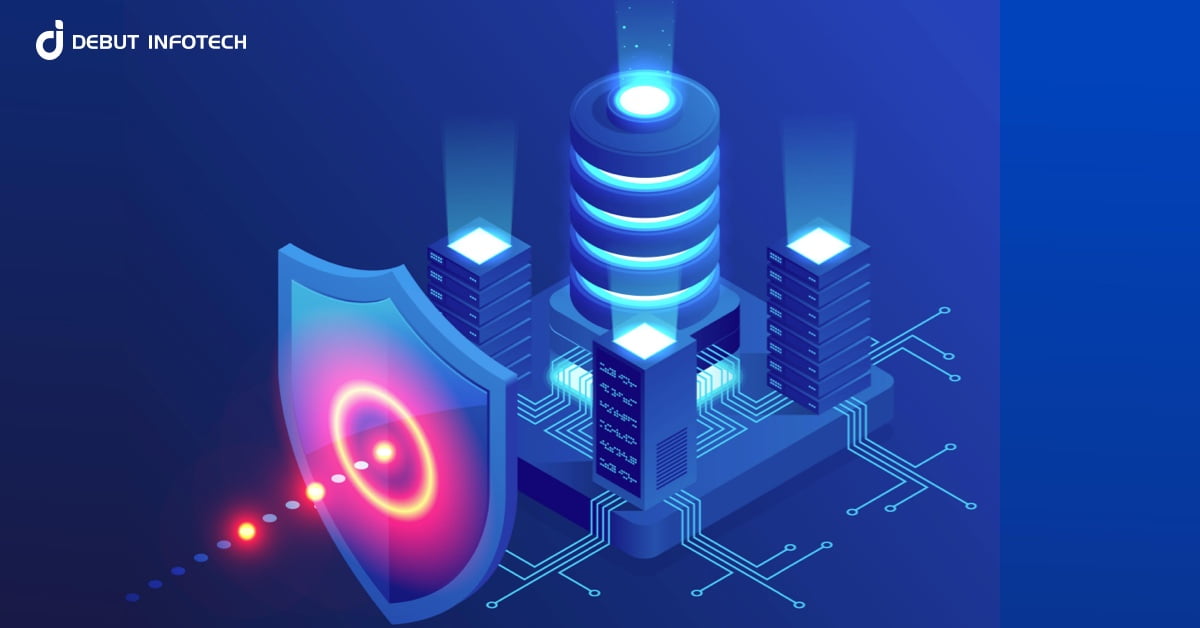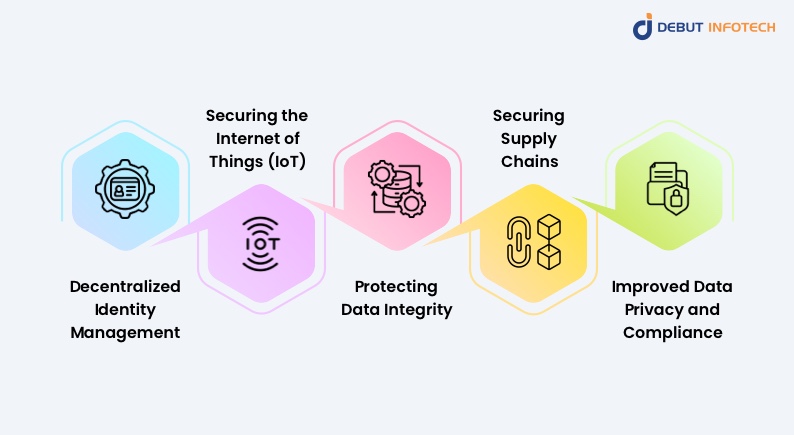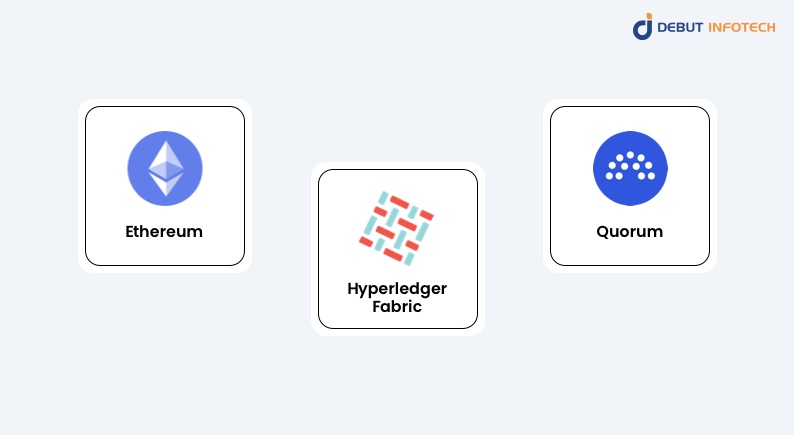Table of Contents
Home / Blog / Blockchain
Blockchain in Cybersecurity: How Blockchain Technology Enhances Data Security
November 5, 2024

November 5, 2024
The requirement of strong cybersecurity measures has grown increasingly important nowadays. Data breaches, hacking events, and identity theft on the rise force companies and people both looking for strategies to guard private data from malevolent parties. Originally designed as the foundation of cryptocurrencies like Bitcoin, blockchain technology has rapidly become a potent weapon for improving data security and handling many of these cybersecurity issues. This has led to the development of blockchain in cybersecurity.
One of the top blockchain development companies in USA, Debut Infotech is dedicated to enabling enterprises to use blockchain technology to fortify their cybersecurity systems. Our products seek to secure privacy, defend sensitive information, and offer data management openness and responsibility.
This blog will examine the role of blockchain in cybersecurity and how it might improve data security and safeguard privacy in an increasingly digital environment. We will also look at some blockchain application scenarios across sectors, clarifying how companies are already gaining from blockchain-based cybersecurity solutions.
Looking to strengthen your cybersecurity with blockchain solutions?
Contact us today to explore how we can secure your data and protect your business from cyber threats.
The Role of Cybersecurity in a Digital World
Cybercriminals are finding fresh and creative ways to access systems and pilfer private data as technology develops. There were about 6.95 million data breaches reported worldwide in 2023 alone. Conventional cybersecurity solutions, which usually depend on centralized systems, are unable to fight the advanced risks of the modern world.
Data kept in one place in a centralized cybersecurity system is prone to assaults aimed at the central server. Once hacked, an attacker has access to every sensitive data kept in that database. Human mistakes, including improperly set up servers or weak passwords, further aggravating the hazards.
Here blockchain in cybersecurity presents a more safe, decentralized substitute. Blockchain removes the single point of failure by spreading data among a network of nodes, therefore assuring that the whole system is intact even should one node be compromised.
How Blockchain Technology Works in Cybersecurity
One must first grasp the fundamental ideas of blockchain technology to grasp how blockchain works in cybersecurity. Operating as a decentralized ledger system, blockchain uses cryptographic hashes to link every data block to the next from all around. Once data is entered on a blockchain, this architecture guarantees almost impossible change or manipulation capability.
Blockchain technology’s main characteristics that support its cybersecurity advantages include:
- Decentralization: Unlike conventional systems whereby data is kept on centralized servers, blockchain distributes data among several nodes, each carrying a copy of the whole blockchain. This guarantees that the other nodes stay safe even if one of them is hacked, therefore offering resistance against attack.
- Immutability: Once information is entered into a blockchain, it cannot be changed without network agreement. This immutability guarantees that data stays tamper-proof and safe, producing an unchangeable audit trail for every blockchain transaction.
- Encryption: Blockchain uses cryptographic methods for data security. Using cryptographic hashes, every block in the chain is connected to the one before, it makes it quite tough for hackers to access the data undetectably.
- Transparency: Blockchain is a transparent system that enables everyone connected to view and confirm transactions. This openness offers traceability and responsibility, facilitating the identification of any illegal data modification.
These qualities make blockchain the perfect answer for cybersecurity problems. It provides a degree of security, openness, and responsibility that is difficult to achieve with conventional centralized systems.
Blockchain’s Role in Strengthening Cybersecurity and Protecting Privacy

Blockchain technologies’ capacity to improve privacy and cybersecurity is among their main benefits. These are some of the ways blockchain’s roles in strengthening cybersecurity and protecting privacy are starting to show themselves.
1. Decentralized Identity Management
Decentered identity management is among the most exciting blockchain use cases in cybersecurity. Traditional systems of identity management depend on centralized databases where personal identification numbers (PINs), passwords, and sensitive data including usernames are kept. Cybercriminals target these centralized systems especially, which causes data leaks and identity theft.
Blockchain’s self-sovereign identities help people take control over their personal information. Blockchain lets users disperse their credentials rather than keep identifying data in a centralized database. It guarantees more transparent and safe identity verification procedures, therefore lowering the fraud risk.
2. Securing the Internet of Things (IoT)
IoT devices give hackers new loopholes to exploit as they keep proliferating. From smart home appliances to industrial sensors, many IoT devices—from which attackers can easily target—have weak security mechanisms.
Blockchain creates a decentralized and encrypted communication system for IoT devices that helps secure these networks. It allows IoT devices to securely share data without depending on a centralized server, lowering the network risk of attack. Furthermore, blockchain’s unchangeable record-keeping guarantees fast identification and resolution of any illegal network access.
3. Protecting Data Integrity
Protection of data integrity is one of the main benefits of blockchain in cybersecurity. Traditional systems allow outsiders to change or manipulate data, therefore creating errors and security flaws. With its unchangeable ledger, blockchain guarantees that once data is entered on the chain it stays exactly as it was.
This is especially crucial in sectors like finance and healthcare, where data accuracy is vital. Sensitive data stored on blockchain allows companies to guarantee that their data stays tamper-proof, current, and accurate.
4. Securing Supply Chains
Supply chain security is yet another important blockchain use case. Data breaches, fraud, and counterfeiting are among the several cyber dangers supply chains come across. Because blockchain offers an unchangeable record of every transaction or movement of items inside the chain, its decentralized and open character makes it a perfect answer for safeguarding supply chains.
Blockchain lets businesses monitor the validity, movement, and origin of products all across the supply chain, therefore guaranteeing accurate and open data. Along with improving confidence among supply chain players, this can help lower the risk of fraud and counterfeit goods
5. Improved Data Privacy and Compliance
Blockchain technologies can greatly facilitate data privacy and regulatory compliance. Strict data privacy rules, including GDPR (General Data Protection Regulation) and HIPAA (Health Insurance Portability and Accountability Act), apply to several sectors, including finance and healthcare. Ignoring these rules could result in big fines and a bad reputation.
Blockchain lets firms keep data encrypted and decentralized, safeguarding private information and ensuring that enterprises stay in regulatory compliance. Furthermore, blockchain systems can automate compliance procedures using smart contracts, guaranteeing that data is treated in accordance with the required rules free from human involvement.
Related Article: How Blockchain Enhances Data Privacy and Security in Businesses?
Real-World Blockchain Use Cases Across Industries
Numerous industries are seeing an increase in the use of blockchain for business purposes, with cybersecurity serving as one of the main forces behind this trend. Among the leading sectors where blockchain is improving cybersecurity are:
1. Banking and Finance
Blockchain’s ability to improve security and openness in financial transactions has drawn swift acceptance from the banking industry. Banks and other financial companies are using blockchain to guard cross-border transactions, stop fraud, and guarantee financial data integrity.
Apart from improving security, blockchain offers openness in financial transactions so that auditors and authorities may monitor the fund movement and guarantee adherence to financial rules.
2. Healthcare
Another field where blockchain is helping to improve data security and privacy is in healthcare. Because they keep so much private patient data, healthcare professionals are especially vulnerable targets for cyberattacks. Healthcare records can be safely kept and managed using blockchain technology, guaranteeing data security and patient privacy preservation.
Blockchain can also help simplify the exchange of medical records between different healthcare facilities, lower administrative costs, and enhance patient results.
3. Government
Governments worldwide are investigating blockchain systems to improve the security of their digital infrastructures. Blockchain technology can secure public services, voting systems, and government records, guaranteeing data protection from illegal access and manipulation.
Regarding voting, blockchain technology presents a means of safe, open, tamper-proof elections. Governments can guarantee fair elections, and that votes cannot be manipulated by keeping voting records on blockchain systems.
4. Supply Chain Management
From pharmaceuticals to agriculture, supply chains across several sectors are being secured using blockchain technology as was discussed before. Blockchain can help lower fraud, increase efficiency, and strengthen confidence among supply chain participants by offering a clear, unchangeable record of every transaction conducted inside the chain.
Businesses are also adopting blockchain consulting services to incorporate blockchain into their supply chains. This enables real-time monitoring and tracking of items, guaranteeing their authenticity and integrity.
The Growing Need for Cybersecurity Solutions
The move toward digital transformation in many sectors has produced an explosion of generated, kept and shared data. This has rendered sensitive data more susceptible to cyberattacks even while it has created new opportunities for invention. High-profile breaches have impacted companies in government, finance, healthcare, and other areas lately. Firewalls and antivirus software are only old cybersecurity solutions that will not be enough to handle these difficulties.
Blockchain’s value in cybersecurity is swiftly drawing attention as companies look for ways to protect private data and guarantee anonymity. Blockchain’s distributed, open, unchanging character makes it more difficult for hackers to violate data integrity.
The Role of Blockchain Development Companies in Enhancing Cybersecurity
Top blockchain development companies are significantly helping to build and scale blockchain-based cybersecurity solutions as blockchain technology develops. As a leading enterprise blockchain consulting company in the USA, Debut Infotech leads this trend by offering companies tailored blockchain solutions fit for their particular cybersecurity needs.
Our blockchain consulting services at Debut Infotech cover everything from initial consultation and solution architecture to complete-scale deployment. We assist companies in using blockchain technology to improve their compliance with legal regulations, cybersecurity posture, and protection of private information.
Our services include:
- Custom Blockchain Solutions: We create blockchain systems that are fit for your sector and company, addressing your specific needs and requirements.
- Blockchain Data Privacy Solutions: Modern blockchain-based privacy solutions help to guard private data by means of cutting edge technologies.
- Compliance Consultation: Our knowledgeable staff guides companies toward compliance with changing worldwide data privacy laws.
- Decentralized Identity Management: We build decentralized identity management systems, allowing people authority over their personal information.
Blockchain Platforms for Strengthening Cybersecurity

Companies can use many blockchain platforms available to improve their security protocols. Every platform provides special tools and capabilities meant to increase privacy protection and data security.
1. Ethereum
Among the most often used blockchain systems, Ethereum offers a decentralized structure for creating safe applications. Its smart contract features let companies streamline procedures, guaranteeing that security measures are followed without human involvement.
2. Hyperledger Fabric
An open-source blockchain tool meant for business use is Hyperledger Fabric. Its modular design lets companies create scalable, safe programs that fit their requirements. Supply chain security benefits, especially from Hyperledger Fabric, since it offers a visible, unchangeable ledger for tracking items and validating their authenticity.
3. Quorum
This blockchain platform is designed especially for businesses in controlled sectors such as finance and healthcare. For companies needing security and compliance, it provides sophisticated privacy features such as private transactions and permissioned networks, guiding their choice.
How Debut Infotech Can Help Enhance Cybersecurity with Blockchain
Our speciality at Debut Infotech is offering innovative blockchain consultancy services to enable companies to improve their infrastructure for cybersecurity. Our blockchain solutions are meant to guard against changing cyber threats, guarantee regulatory compliance, and secure private information.
Our experience covers a broad spectrum of industries, and we have created tailored blockchain solutions to meet their particular difficulties. Our blockchain solutions can offer the security and openness you require, whether your goals are to improve data privacy, secure IoT devices, or streamline supply chain management.
We offer a comprehensive suite of services, including:
- Blockchain Platforms Development: Custom-built systems guaranteeing compliant, scalable, and secure blockchain solutions abound in blockchain platform development.
- Blockchain Use Cases: We find and apply blockchain use cases catered to your sector so you may fully enjoy blockchain technology in improving cybersecurity.
- Smart Contracts and Automation: Smart contracts automatically guarantee that data is handled effectively and securely, ensuring compliance procedures.
Debut Infotech will help you to use blockchain for business to fortify your cybersecurity systems and protect your data against future risks.
Discover the future of cybersecurity with blockchain!
Learn more about our cutting-edge blockchain solutions designed to safeguard your digital assets and data.
Conclusion
Conventional security systems are insufficient to safeguard private information and guarantee privacy as cyber threats increase in scope and complexity. Blockchain’s decentralized, unchangeable, open character presents a game-changing way to improve cybersecurity in many different sectors. Blockchain technology in cybersecurity is revolutionizing how companies handle data security, whether that means safeguarding digital identities, IoT networks, or supply chain integrity.
At Debut Infotech, we are dedicated to enabling companies to use blockchain technologies to build stronger and more safe systems. As a blockchain development company in USA, we provide development services, custom blockchain solutions, and advice meant to improve your cybersecurity setup. Let us assist you to realize blockchain’s possibilities in protecting the future of your company.
Frequently Asked Questions
Blockchain is considered the future of cybersecurity because of its decentralization, transparency, and immutability, which prevent data tampering and reduce risks of cyberattacks. Its distributed ledger makes it hard for hackers to alter records, offering stronger data protection than centralized systems.
Blockchain is a decentralized ledger that uses cryptographic encryption and decentralized data storage to improve security. This protects sensitive information from being accessed by unauthorized parties, prevents it from being altered, and ensures that it is kept secure throughout a network. Because it is immutable, it guarantees the integrity of the data, which makes it a trustworthy instrument for cybersecurity.
Blockchain ensures data privacy by using cryptographic techniques that secure transactions and user data. It employs public and private keys to control access to data and protect personal information. Only authorized individuals with the correct private keys can access the encrypted data, which helps ensure privacy even within a public blockchain.
Decentralization, data immutability, resistance to tampering, and better encryption are some of the primary advantages that blockchain technology offers in cybersecurity. Blockchain’s unchangeable ledger ensures that once data is recorded, it cannot be updated without the consensus of the whole network. Blockchain’s decentralized structure eliminates the possibility of a single point of failure.
Blockchain helps prevent cyberattacks by eliminating centralized vulnerabilities that hackers typically exploit. Its decentralized framework and distributed ledger system ensure that no single point can be targeted. Additionally, consensus mechanisms and cryptography make it difficult for attackers to alter data without detection.
While blockchain technology itself is considered highly secure due to its cryptographic and decentralized features, it is not entirely immune to hacking. If not properly secured, vulnerabilities can occur in smart contracts, third-party applications, or private keys. However, hacking a blockchain directly is extremely difficult due to its robust security protocols.
Blockchain has many cybersecurity use cases, including identity management, data integrity protection, secure transactions, and supply chain monitoring. It is also being used to enhance IoT security and protect against distributed denial-of-service (DDoS) attacks by decentralizing data storage and control.
Talk With Our Expert
Our Latest Insights
USA
2102 Linden LN, Palatine, IL 60067
+1-708-515-4004
info@debutinfotech.com
UK
Debut Infotech Pvt Ltd
7 Pound Close, Yarnton, Oxfordshire, OX51QG
+44-770-304-0079
info@debutinfotech.com
Canada
Debut Infotech Pvt Ltd
326 Parkvale Drive, Kitchener, ON N2R1Y7
+1-708-515-4004
info@debutinfotech.com
INDIA
Debut Infotech Pvt Ltd
Sector 101-A, Plot No: I-42, IT City Rd, JLPL Industrial Area, Mohali, PB 140306
9888402396
info@debutinfotech.com




Leave a Comment